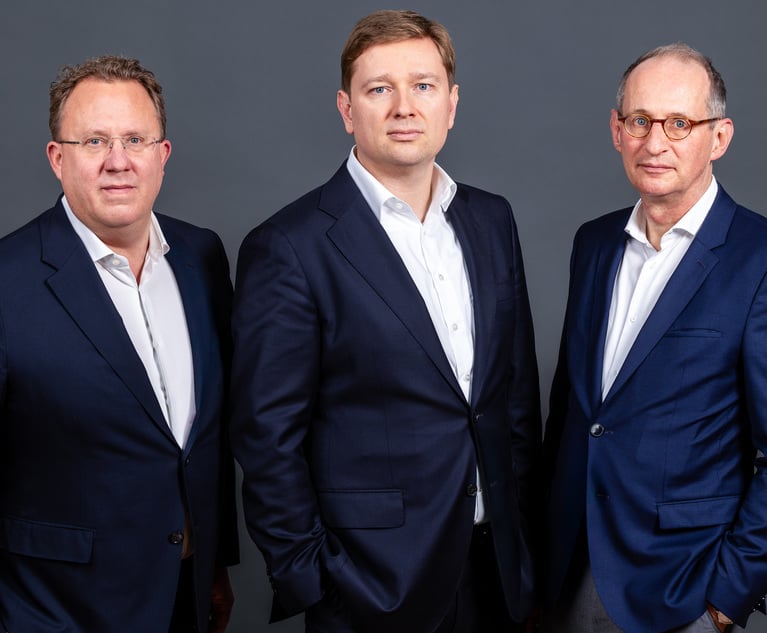Reed Smith 'Innovation Hours' Program Gives Credit for Non-Client Work
The newly adopted initiative gives attorneys up to 50 hours of billable hour credits for putting time in new innovations.
May 15, 2018 at 03:09 PM
4 minute read
 Photo: Diego M. Radzinschi/ALM
Photo: Diego M. Radzinschi/ALM In the latest sign that Big Law firms are working to embrace innovation, Reed Smith is rolling out a new program that lets lawyers earn billable hour credits for time they spend promoting advances in legal technology and operations.
The firm launched a pilot version of the “Innovation Hours” program last year, with 17 lawyers dedicating 364 hours to six selected projects. This year, the firm will sign off on even more projects, while also flagging five particular client-facing endeavors for added support.
“We had a lot of people wanting to engage in new technologies, process improvement, and new ways of working,” said Reed Smith chief knowledge officer Lucy Dillon. “Being able to give people billing credit was the breakthrough way to say to people, 'We really value your ideas and we want you to have the time and to be rewarded for the time to think things through.'”
The move comes as firms are competing for talent with the rising tech sector and legal industry disrupters, and looking to make their practice appealing to millennials. Skadden, Arps, Slate, Meagher & Flom, for example, has established its own innovation contest encouraging associates to pitch new business ideas, but Reed Smith's version is open to lawyers at all levels.
For the inaugural effort last year, Dillon and Innovation Hub manager Alex Smith, who are both based in London, culled six ideas from a total of 30 submissions. Each lawyer involved was encouraged to put up to 50 “innovation hours” towards their billing targets.
Kari Larsen, global co-head of Reed Smith's fintech practice, brought together a team of attorneys for one project: the production of an authoritative white paper on blockchain. U.S. attorneys were joined by lawyers from Singapore, Beijing, Hong Kong and the U.K. in drafting the report, which takes on subjects including data privacy, insurance and capital markets.
“With having the hours, we were able to recruit various experts in the fields from around the firm,” she said.
Another project led to the successful launch of the firm's new Breach RespondeRS app, a free tool that simplifies the application of the patchwork of U.S. state laws to let companies focus on protecting data.
Other efforts involved teams in the United States, Europe and Asia working on the automation of contracts and documents; a review of databases of previous cases and outcomes to identify trends in the managed care industry; and work with a fintech startup on a new technology model.
Dillon said she was pleased with the seriousness and maturity with which all participants—who included associates, partners and of counsel—handled the work. There was no overbilling or wasted hours.
“They came, put a business case forward and had to articulate what they hoped to achieve,” she said. “It was very well-managed.”
For 2018, there's no cap on the number of projects that will be approved, but Dillon will prioritize certain ideas and work closely with practice group leaders to ensure they work.
“I want to make sure there's rigor around the projects that we support,” she said.
Five projects that have direct impact on the firm's clients will get special attention. They'll be part of a fast-track, 12-week program where an extra level of support will come from Smith and consulting firm Janders Dean.
The announcement comes on the heels of Reed Smith's establishment of a legal technology program for select summer associates in both the United States and the U.K. Five law school students—three in the United States and two in the U.K.—will spend part of their summers developing projects that use tech to improve legal services.
➤➤ Want more reporting on the evolving legal industry? Check out The Law Firm Disrupted, a weekly email briefing from Law.com.
This content has been archived. It is available through our partners, LexisNexis® and Bloomberg Law.
To view this content, please continue to their sites.
Not a Lexis Subscriber?
Subscribe Now
Not a Bloomberg Law Subscriber?
Subscribe Now
NOT FOR REPRINT
© 2025 ALM Global, LLC, All Rights Reserved. Request academic re-use from www.copyright.com. All other uses, submit a request to [email protected]. For more information visit Asset & Logo Licensing.
You Might Like
View All
DLA Piper Hires Former FAA Chief Counsel as Transportation Practice Co-Chair

Diversity Lab Alters DEI-Centered Verbiage on Mansfield Certification Website


Big Tech Is Cozying Up to President Trump. Here's Why Their Lawyers Are Cautiously Optimistic
Trending Stories
- 1Jury Seated in Glynn County Trial of Ex-Prosecutor Accused of Shielding Ahmaud Arbery's Killers
- 2Ex-Archegos CFO Gets 8-Year Prison Sentence for Fraud Scheme
- 3Judges Split Over Whether Indigent Prisoners Bringing Suit Must Each Pay Filing Fee
- 4Law Firms Report Wide Growth, Successful Billing Rate Increases and Less Merger Interest
- 5CLOs Face Mounting Pressure as Risks Mushroom and Job Duties Expand
Who Got The Work
J. Brugh Lower of Gibbons has entered an appearance for industrial equipment supplier Devco Corporation in a pending trademark infringement lawsuit. The suit, accusing the defendant of selling knock-off Graco products, was filed Dec. 18 in New Jersey District Court by Rivkin Radler on behalf of Graco Inc. and Graco Minnesota. The case, assigned to U.S. District Judge Zahid N. Quraishi, is 3:24-cv-11294, Graco Inc. et al v. Devco Corporation.
Who Got The Work
Rebecca Maller-Stein and Kent A. Yalowitz of Arnold & Porter Kaye Scholer have entered their appearances for Hanaco Venture Capital and its executives, Lior Prosor and David Frankel, in a pending securities lawsuit. The action, filed on Dec. 24 in New York Southern District Court by Zell, Aron & Co. on behalf of Goldeneye Advisors, accuses the defendants of negligently and fraudulently managing the plaintiff's $1 million investment. The case, assigned to U.S. District Judge Vernon S. Broderick, is 1:24-cv-09918, Goldeneye Advisors, LLC v. Hanaco Venture Capital, Ltd. et al.
Who Got The Work
Attorneys from A&O Shearman has stepped in as defense counsel for Toronto-Dominion Bank and other defendants in a pending securities class action. The suit, filed Dec. 11 in New York Southern District Court by Bleichmar Fonti & Auld, accuses the defendants of concealing the bank's 'pervasive' deficiencies in regards to its compliance with the Bank Secrecy Act and the quality of its anti-money laundering controls. The case, assigned to U.S. District Judge Arun Subramanian, is 1:24-cv-09445, Gonzalez v. The Toronto-Dominion Bank et al.
Who Got The Work
Crown Castle International, a Pennsylvania company providing shared communications infrastructure, has turned to Luke D. Wolf of Gordon Rees Scully Mansukhani to fend off a pending breach-of-contract lawsuit. The court action, filed Nov. 25 in Michigan Eastern District Court by Hooper Hathaway PC on behalf of The Town Residences LLC, accuses Crown Castle of failing to transfer approximately $30,000 in utility payments from T-Mobile in breach of a roof-top lease and assignment agreement. The case, assigned to U.S. District Judge Susan K. Declercq, is 2:24-cv-13131, The Town Residences LLC v. T-Mobile US, Inc. et al.
Who Got The Work
Wilfred P. Coronato and Daniel M. Schwartz of McCarter & English have stepped in as defense counsel to Electrolux Home Products Inc. in a pending product liability lawsuit. The court action, filed Nov. 26 in New York Eastern District Court by Poulos Lopiccolo PC and Nagel Rice LLP on behalf of David Stern, alleges that the defendant's refrigerators’ drawers and shelving repeatedly break and fall apart within months after purchase. The case, assigned to U.S. District Judge Joan M. Azrack, is 2:24-cv-08204, Stern v. Electrolux Home Products, Inc.
Featured Firms
Law Offices of Gary Martin Hays & Associates, P.C.
(470) 294-1674
Law Offices of Mark E. Salomone
(857) 444-6468
Smith & Hassler
(713) 739-1250










